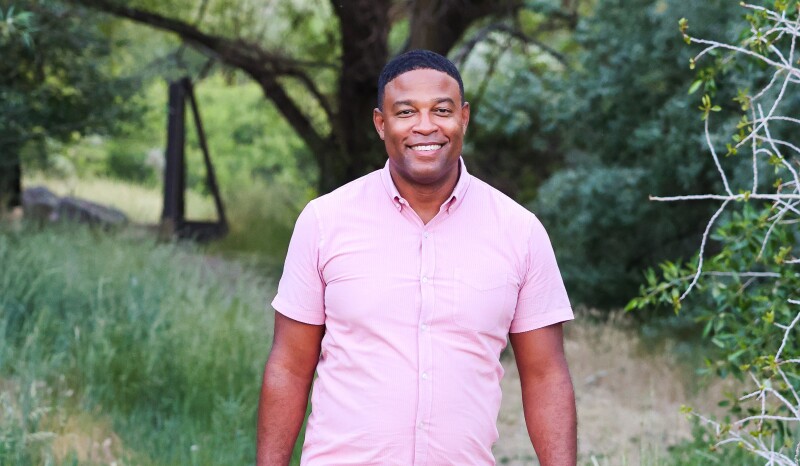Editor’s note: This article is part of a series highlighting the voices of Black Latter-day Saints in honor of Black History Month. Ronell Hugh is a marketer who has worked for some of the best-known companies in the US, including Adobe, Walmart, HP, and Microsoft. He also speaks in firesides, devotionals, and company presentations, where he invites others to create a world that is more inclusive and where everyone feels they belong.
Inclusion and belonging have been a key part of my love for the gospel of Jesus Christ ever since I was a young boy growing up in Germany. My parents were great examples of faith and always provided ways for us to learn about Jesus Christ through the Bible. They also instilled in me the importance of treating people with respect and dignity regardless of their color, ethnicity, nationality, gender, or sexuality—the outcome of this being a feeling of inclusion and belonging among those we associated with.
As a family, we moved to the US when I was almost eight years old, where we were able to live close to my dad’s family in North Carolina. We attended many different churches including Southern Baptist, Methodist, and Jehovah’s Witnesses. Each one of the religious communities was welcoming and uplifting.
My first experience feeling like I wasn’t included and that I didn’t belong also happened while we were living in North Carolina. I remember that day perfectly. I was walking down our rock driveway to the mailbox in our neighborhood to collect the mail. When I got to the mailbox, I saw that there was a sticker on the outside with three letters on it—KKK. I had no idea what those three letters meant. So I gathered the mail and ran back into the house to give my mom the mail. I told her about the sticker, and even now I can still see her face—horror, concern, sadness, and anger—all rolled into one as she learned about what had happened. For me, there was this feeling of fear and being scared. I was trying to figure out what was happening since this was the first time I’d ever experienced anything like this, and it left an indelible imprint on my mind. It also led to many conversations with my mom and dad about what it means to be a Black person in America and racism, often referred to as “The Talk.”
We then moved to Coventry, England, when I was 10 to be closer to my grandmother on my mom’s side. For the first two years of living there we didn’t attend any church or participate in any religion. As a family, we had a challenging experience that forced us into a homeless shelter for a period of time. This experience was the impetus, in my mind, to reignite an interest in religion leading to an effort to find a church we could attend. It was my dad who stumbled upon some sister missionaries who taught us the gospel, helping me to become a member of The Church of Jesus Christ of Latter-day Saints at the age of 14, along with my family. As I look back on that experience, it’s obvious it was a natural spiritual progression in my personal faith journey as I recognized His teachings that could—and would—make me a better person. The gospel of Jesus Christ has always been a gospel of belonging, in my mind, and that’s the message that was reinforced when the missionaries taught my family about the Savior.
As I’ve matured, one of the things I’ve always loved about the Savior, Jesus Christ, and His gospel is how inclusive He was. Jesus Christ always exhibited charity to everyone no matter their cultural background, ethnicity, skin color, language, nationality, gender, or sexuality. We are each children of God—sisters and brothers. Everyone who met or associated with the Savior felt this and knew they belonged.
One of my favorite scripture stories of this is when Jesus was traveling from Jerusalem to Galilee. During the journey He stopped at a well in Sychar, Samaria, to rest as His disciples went into the city to purchase food. It was at the well He met a Samaritan woman who came to draw water.
Jesus’s conversation with the Samaritan woman starts simply with a request by Him for water. Her response, “How is it that thou, being a Jew, askest drink of me, which am a woman of Samaria? for the Jews have no dealings with the Samaritans” (John 4:9). Her question was valid given the centuries of hate and confrontations that had existed between the Jews and the Samaritans.
Her pointed question led to a conversation where the Lord used water as an analogy to teach that He is the living water. Speaking about the water in the well, He simply expressed, “Whosoever drinketh of this water shall thirst again: But whosoever drinketh of the water that I shall give him shall never thirst; but the water that I shall give him shall be in him a well of water springing up into everlasting life” (John 4:13–14).
It was through their conversation that the woman learned the man she was speaking with was the Messiah, Jesus Christ, the living water. This meeting led not only to her gaining a testimony and being converted to Jesus Christ, but to many of her fellow Samaritans gaining testimonies as well.
Simply put, the gospel of Jesus Christ is for everyone. There are no requirements to be a receiver of it. In a recent conference talk titled “The Doctrine of Belonging,” Elder D. Todd Christofferson declared, “As the long-prophesied latter-day gathering of the Lord’s covenant people gains momentum, the Church will truly be composed of members from every nation, kindred, tongue, and people. This is not a calculated or forced diversity but a naturally occurring phenomenon that we would expect, recognizing that the gospel net gathers from every nation and every people. …
“Having been given this privilege, we cannot permit any racism, tribal prejudice, or other divisions to exist in the latter-day Church of Christ. The Lord commands us, ‘Be one; and if ye are not one ye are not mine.’ We should be diligent in rooting prejudice and discrimination out of the Church, out of our homes, and, most of all, out of our hearts. As our Church population grows ever more diverse, our welcome must grow ever more spontaneous and warm. We need one another.”
▶You may also like: From trepidation to personal revelation—1 Black woman's conversion story
Jesus Christ is the greatest example of inclusiveness and belonging. His gospel is for every person on this earth regardless of their religion, ethnicity, skin color, gender, or sexual orientation. Every person on this earth is a child of God and should be treated with that eternal identity in mind. When we do, we can create a world where we see and treat each other as sisters and brothers in our heavenly parents’ family.
There have been many times in my life when I’ve longed for a world where we see each other the way our heavenly parents do. My life, and the lives of my loved ones, have been full of far too many experiences where inclusion and belonging were scarce. It’s why I’m sharing a message today of the need for more inclusion and belonging in the workplace, in church, and in our communities.
My inspiration comes from the Savior’s example, which gives me hope. His life motivates me daily to see every single one of my sisters and brothers as children of God—just as He sees us. That view of who we are and who we belong to inspires me to think and act in ways that are inclusive. It’s a reminder to me that in small and simple ways, we can be instruments in the Lord’s hands by helping all people feel His love through our words and actions. In the end, this is what will create the greatest unity between us, helping every one of us feel that we truly belong.


